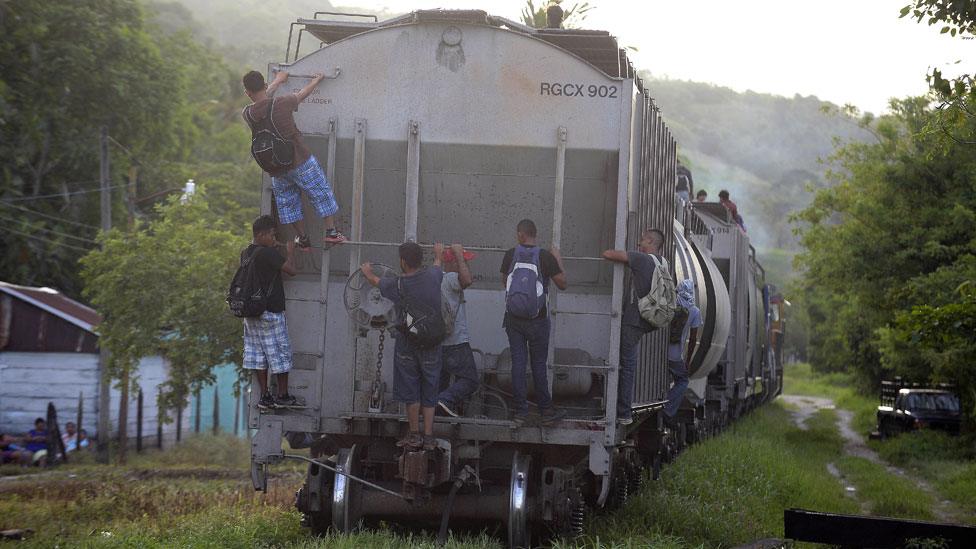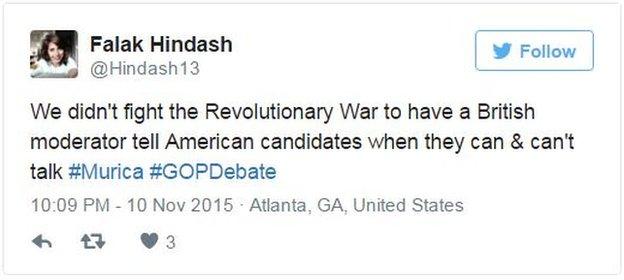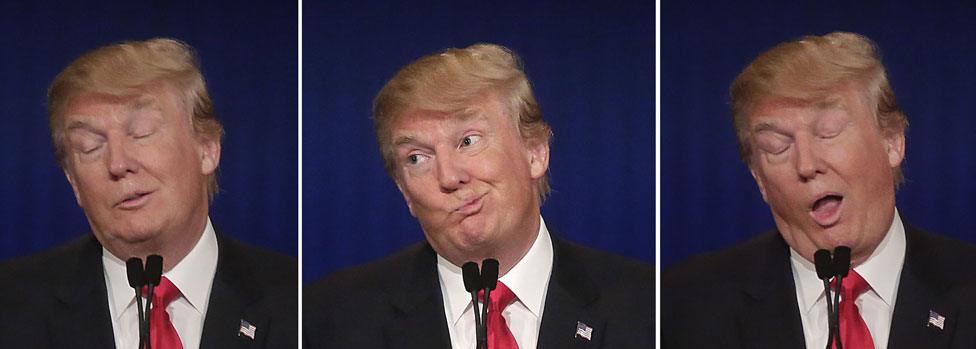Republican debate: Trump's immigration plan savaged by rivals
- Published
- comments
BBC correspondent Gary O'Donoghue says there was no clear winner from the debate
Republican Donald Trump's plan to deport 11 million undocumented immigrants from the US has been savaged by his party rivals in a TV debate.
His hardline proposal was attacked as impractical and divisive by John Kasich and Jeb Bush, who are also running for the Republican presidential nomination.
Mr Trump, a billionaire New Yorker who has been leading in the polls, was booed as he tried to counter-attack.
Another source of friction at the debate in Milwaukee was foreign policy.
The eight candidates were divided on whether the US should do more to intervene in the Middle East, especially in the fight against Islamic State militants.
But immigration sparked the biggest confrontation, when Mr Trump said a wall should be built at the US-Mexico border and all migrants living illegally in the US must be deported.
This was met with disdain by Mr Kasich, the governor of Ohio.
"Come on, folks, we all know you can't pick them up and ship them back across the border. It's a silly argument. It's not an adult argument."
Mr Bush, the former Florida governor, said it would tear families apart and played into the hands of Democratic frontrunner Hillary Clinton.
Other highlights:
Mr Trump said the US should look at what Israel had achieved when it came to building a border wall
He also slammed the Trans-Pacific Partnership and China's "currency manipulation" but seemingly did not realise that China was not party to the trade deal
Marco Rubio called Rand Paul "a committed isolationist" and made the case for a "strong" US foreign policy
Mr Bush was scathing of Mr Trump's anti-interventionist views and said the US "better be the world's leader"
Senator Ted Cruz counted the Department of Commerce twice when naming five government agencies he would shut - in a gaffe reminiscent of Rick Perry's 2011 debate meltdown


Migrants hitch rides through Mexico on freight trains
The debate, hosted by Fox Business, began by talking about raising the minimum wage, which several candidates opposed.

At the scene - Nick Bryant, BBC News, Milwaukee
Jeb Bush, who was more forceful than in previous debates, said that Hillary Clinton's campaign would be doing high-fives because Mr Trump's hardline stance on immigration threatened to alienate Latino voters, a fast-growing demographic.
Mr Trump was also booed when he asked of the only woman on stage, the former executive Carly Fiorina, "why does she keep on interrupting everyone?"
Marco Rubio, who's surged in the polls at Mr Bush's expense, had another good night. Rand Paul probably had the best two hours of his campaign.
Ben Carson, who has faced questions about exaggerating parts of his inspiring life story, escaped unscathed. Crucially, not one of his opponents mounted an attack.

Florida Senator Marco Rubio said vocational education was instead a better way to unlock American potential.
"Welders make more money than philosophers. We need more welders and less philosophers."

Who is Gerard Baker?
US viewers of the Republican presidential debate on Monday were bemused by a British accent behind the moderators' desk. Who was the plummy-voiced man alongside Fox anchors Maria Bartiromo and Neil Cavuto?
He was Gerard Baker, an Oxford-educated economist and now editor-in-chief of the Wall Street Journal. Mr Baker, who joined the Journal in 2009 and took charge in 2013, is also the first Briton to moderate a US presidential debate.
He is not, as some took to Twitter to wonder, the same Gerard Baker that starred in the action film 300 - that was Gerard Butler.

The British co-host caused American bemusement

At one point, Mr Rubio and Kentucky Senator Rand Paul tangled over the issue of military spending, with Mr Paul saying his rival's plan to increase military spending went against conservative principles.
"We can't even have an economy if we're not safe," responded Mr Rubio.
The primary elections, in which the Republican party and the Democratic party pick their presidential nominees, begin in February in the state of Iowa.
And the nation will go to the polls in November to finally pick its new president.

Trump expressed several emotions as Cary Fiorina spoke